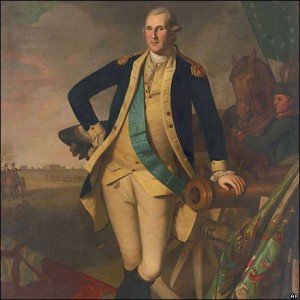That seems like a speculative topic—to try and guess what our first president under the Constitution would have to say to modern Americans.
But actually I won’t speculate at all. I’ll use some of his own writings to make my points (or his points). And they won’t be from some of his obscure writings, gleaned from arcane, private letters the way the Supreme Court did in a 1947 decision with a private letter Thomas Jefferson wrote to the Danbury Baptists. That decision changed forever the way religion, specifically Christianity, is treated in the public square—and not for the better.
George Washington, the father of our country, sent out in written form his Farewell Address (September 19, 1796). In this classic piece of American political writing, he gives some warnings to his fellow Americans (and us) just as a “parting friend” might do.
He said in that message: “Of all the dispositions and habits which lead to political prosperity, religion and morality are indispensable supports. In vain would that man claim the tribute of patriotism, who should labor to subvert these great pillars of human happiness.” When the founding fathers spoke of “religion,” they were speaking of Christianity, in a nation which at the time was 99.8 percent Christian (Benjamin Hart, “The Wall that Protestantism Built,” Policy Review, Fall 1988).
Like the other founders, Washington believed that for the Constitution to work, the people needed to be virtuous. As he himself put it in the Farewell Address, “virtue or morality is a necessary spring of popular government.”
What was the source of virtue, according to them (even some of the unorthodox amongst them)?
Religion (on a voluntary basis)—always with the rights of conscience in place. Thanks to the framers of our nation, we are free to believe (or not believe) whatever we want in this country. Only to God, and not the state, shall we give an account.
Washington elaborated on the importance of “religion and morality” (again from his final public message): “The mere politician, equally with the pious man, ought to respect and to cherish them. A volume could not trace all their connections with private and public felicity. Let it simply be asked: Where is the security for property, for reputation, for life, if the sense of religious obligation desert the oaths which are the instruments of investigation in courts of justice?”
In case any one doesn’t get the point, he basically asks, how can morality continue without faith? It cannot, Washington warns: “And let us with caution indulge the supposition that morality can be maintained without religion. Whatever may be conceded to the influence of refined education on minds of peculiar structure, reason and experience both forbid us to expect that national morality can prevail in exclusion of religious principle” [Emphasis mine].
But so many now think we’re so much smarter today. In fact, in 1980, in Stone v. Graham, the US Supreme Court struck down the posting of the Ten Commandments in schools. Why? Because Little Johnny might read them and obey them.
They declared: “If the posted copies of the Ten Commandments are to have any effect at all, it will be to induce the schoolchildren to read, meditate upon, perhaps to venerate and obey, the Commandments. However desirable this might be as a matter of private devotion, it is not a permissible state objective under the Establishment Clause.”
Whatever the outcome of today’s elections, in all the different races, from local dogcatcher to president, we have a lot of ground to make up.
George Washington also said that as a nation we should never expect God’s blessings if we continue to defy His Word. In his First Inaugural Address, he said: “The propitious smiles of Heaven can never be expected on a nation that disregards the eternal rules of order and right which Heaven itself has ordained.” (The Ten Commandments come to mind.)
The propitious smiles seem to have turned into a frown lately. But why should God be pleased with a nation that slaughters millions of unborn babies, redefines God-ordained marriage, and is awash with immorality?
Finally, Washington did not just urge his fellow Americans to follow God’s eternal laws, he urged them to follow Christ. He said that we can never hope to be a happy nation unless we imitate the Savior. After the war, but before the official treaty ending the conflict, Commander-in-Chief Washington sent a letter to the governors of the thirteen states. It was a famous letter, dated June 13, 1783, and is called the “Circular to the States.” Near the end of this circular, Washington said that he prayed we will all learn to imitate the Lord. This is exactly how he worded it:
I now make it my earnest prayer…that he would most graciously be pleased to dispose us all, to do Justice, to love mercy, and to demean ourselves with that Charity, humility and pacific temper of mind, which were the Characteristics of the Divine Author of our blessed Religion, and without an humble imitation of whose example in these things, we can never hope to be a happy Nation.
How far we have fallen from the vision of the father of our country who said that we would only be a happy nation if we imitate Christ. Therefore, shouldn’t we as a nation ask ourselves: Are we imitating Christ? Are we a happy nation?
The answer to both of these questions is obvious. May God help us to get back on the right track.
###
Jerry Newcombe, D.Min., is co-host of and spokesman for Truth that Transforms with D. James Kennedy (formerly The Coral Ridge Hour). He has also written or co-written 23 books, including The Book That Made America: How the Bible Formed Our Nation and Answers from the Founding Fathers. Jerry co-wrote (with Dr. Peter Lillback) the bestselling, George Washington's Sacred Fire.www.truthinaction.org.
Jerry Newcombe, D.Min.
Spokesperson/On-Air Host
Fax: 954-772-8303
E-mail: j.newcombe@tiam.org
P.O. Box 1
Fort Lauderdale, FL 33302
www.TruthInAction.org

Be First to Comment